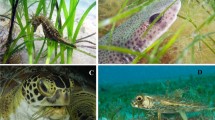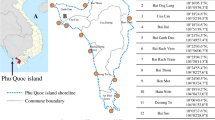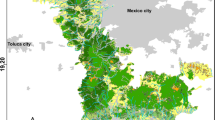Abstract
The freshwater resources of India are currently experiencing an alarming decline in fish biodiversity due to several factors and as a result, a sizeable portion of fresh water fishes have been categorized as threatened. This emphasizes an immediate need for initiating research and actions for alternative management techniques to protect these aquatic systems. One such option that has potential to protect freshwater ecosystem from numerous threats is the creation of freshwater aquatic sanctuary (FAS) within protected area network. Though similar conservation practices are well established in the terrestrial and marine ecosystem, however, the work on freshwater systems has been very slow and negligible. In the present communication we conceptualized the need and approach for developing FAS within the protected area network based on our observations in the water bodies of the selected wildlife sanctuaries in Northern India as well as success stories of some other countries. In this study we assessed the fish diversity in the selected protected areas of Northern India. The assessment indicated that these sanctuaries harbor 28.26–31.13% of freshwater fishes, which are threatened in other areas. Apart from Indian Major Carps, Tor putitora, Chitala chitala, Pangasius pangasius, Clupisoma gerua, Ailia coila, Aorichthys aor, Wallago attu, Rhinomugil corsula, Ompok pabda, Ombok pabo etc. were the important species encountered in the protected waters. The various issues related to FAS including objectives, approach, potential tools, implementation and management are discussed towards saving endangered fish germplasm resources. Approaches, tools and modus operandi proposed in this communication could be utilized by other developing countries in the region.


Similar content being viewed by others
References
Agarwala S, Raksakulthai V, van Aalst M, Larsen P, Smith J, Reynolds J (2003) Development and climate changing in Nepal: focus on water resources and hydropower. Environment Directorate Organization for Economic Cooperation and Development, Paris
Anonymous (1992–1993) Annual report. National Bureau of Fish Genetic Resources, Lucknow, Uttar Pradesh, India
Arunachalam M, Sankarnarayanan A (1999) Fishes of Gadana river in Kalakkad Mundanthurai Tiger Reserve. J Bombay Nat Hist Soc 96(2):232–238
Bayle-Sempere JT, Ramos-Espla A (1993) Some population parameters as bioindicators to assess the ‘reserve effect’ on the fish assemblage. In Qualitdu Milieu Marine-indicateurs Biologiques et Physico-Chimiques. GIS Posidonie: Marseille, 189–214
Bell JD (1983) Effects of depth and marine reserve fishing restrictions on the structure of a rocky reef fish assemblage in the North-Western Mediterranean Sea. J Appl Ecol 20:357–369
Bhatt A (2003) Diversity and composition of freshwater fishes in river system of Central Western Ghats, India. Environ Biol Fish 68:25–38
Biswas SP, Barua S (2000) Fisheries ecology of the North Eastern Himalayas with special reference to the Brahmaputra river. Ecol Eng 16:39–50
Braatz S (1992) Conserving biological diversity: a strategy for protected areas in the Asia-Pacific Region. The World Bank, Washington, DC
Bruton MN (1995) Have fishes had their chips? The dilemma of threatened fishes. Environ Biol Fish 43:1–27
CAMP (1998) Report of the workshop on Conservation Assessment and Management Plan for freshwater fishes of India. Zoo Outreach organization and NBFGR, Lucknow, 22–26 September, 1997, 156 p
Caughley G, Gunn A (1996) Conservation biology in theory and practice, Chap. 19. Black Science Inc. USA, pp 312–340
Cowx IG (2002) Analysis of threats to freshwater fish conservation: past and present challenges. In: Collares-Pereira MJ, Cowx IG, Coelho MM (eds) Conservation of freshwater fishes: option for the future. Blackwell Scientific Press, UK, pp 201–220
Creese RG, Cole RG (1995) Marine conservation in New Zealand. Pac Conserv Biol 2:55–63
Crivelli AJ (2002) Small areas designed to protect against habitat degradation and to limit exploitation. In: Collares-tereira MJ, Cowx IG, Coelho MM (eds) Conservation of freshwater fishes. Options for the future. Oxford Fishing News Books, Blackwell Science, pp 373–388
Dahanukar N, Rout R, Bhatt A (2004) Distribution, endemism and threat status of freshwater fishes in the Western Ghats of India. J Biogeogr 31:123–136
Danielsen F, Balete DS, Poulsen MK et al (2000) A simple system for monitoring biodiversity in protected areas of a developing country. Biodivers Conserv 9:1671–1705
Davey AG (1996) Draft guidelines for natural system planning for protected areas. Draft IUCN, Gland Switzerland
Davidson RJ, Villouta ER, Cole G et al (2002) Effects of marine reserve protection on spiny lobster abundance and size at Tonga Island Marine Reserve, New Zealand. Aquat Conserv: Mar Freshw Ecosyst 12:213–227
Doppelt B, Scurlock M, Frissell C, Karr J (1993) Entering the watershed. Island press, Covelo, CA, p 504
Dufour V, Jouvenel J-Y, Galzin R (1995) Study of a reef fish assemblage: comparison of population distribution between depths in protected and unprotected areas over one decade. Aquat Living Resour 8:17–25
Duncan JR, Lockwood JL (2001) Extinction in a field of bullets: a search for the cause in the decline of the world’s freshwater fishes. Biol Conserv 102:97–105
ENVIS–Wildlife and Protected area database (2006) Wildlife Institute of India, Dehradun–248001. website: www.wii.gov.in/envis/pa_database.html
Filipe AF, Marques TA, Seabra S, Taigo et al (2004) Selection of priority areas for fish conservation in Guadiana River Basin, Iberian Peninsula. Conserv Biol 18:189–200
Fitzsimons JA, Roberon HA (2005) Freshwater reserves in Australia: direction and changes for the development of a comprehensive, aquaculture and representative system of protected areas. Hydrobiologia 552:87–97
Francour P (1991) The effect protection level on a coastal fish community at Scandola, Corsica. Revue d’Ecologie Terre Vie 46:65–81
Higgins JV, Breyer MT, Fitzhugh TW (2005) A freshwater classification approach for biodiversity conservation planning. Conserv Biol 19:432–445
Husain A (1983) Fish Fauna of Corbett National Park, Uttar Pradesh. “CHEETAL” Journal of the W.I.P.S. of India. 17(2). Seabra: 39–42
Hussain SA (1996) Summary report on status of wetland protected areas in India. Wildlife Institute of India, Unpublished report, 25 pp
Johnson NC (1995) Biodiversity in the balance. Approaches to setting geographic conservation priorities, Biodiversity support programme, WWF-Washington, USA
Kapoor D, Sarkar UK (2004) Endangered fish germplasm conservation and management within wildlife protected areas of India. In: Protected habitats and biodiversity. Nature conservators, Publication 8, pp 241–248
Keith P (2000) The part played by protected areas in conservation of threatened French freshwater fish. Biol Conserv 92:265–273
Kelleher G, Kenchington R (1992) Guidelines for establishing marine protected areas. A marine conservation and development report. IUCN, Gland, Switzerland. Vii + 79 pp
Lake PS (1980) Conservation. In: Williams WD (ed) An ecological basis for water resource management. Australian University Press, Canberra, pp 163–173
Lakra WS, Sarkar UK (2007) Fish diversity of Central India. NBFGR Publication, Lucknow, Uttar Pradesh, pp 1–183
Li HW, Currens K, Bottom, Clarke DS et al (1995) Safe havens: refuges and evolutionary significant units. Am Fish Soc Symp 17:371–380
Lyle AA, Maitland PS (1992) Conservation of freshwater fish in the British Isles: the status of fish in National Nature Reserves. Aquat Conserv: Mar Freshw Ecosyst 2:19–34
Manimekalan A (1998) The fishes of Mudumalai Wildlife Sanctuary. J Bombay Nat Hist Soc 95:431–443
Means ML, Johnson JE (1995) Movement of threatened Ozark cavefish in Logan Cave National wildlife Refuge, Arkansas. Southwest Nat 40:308–313
Miller JA, Campbell CE (1994) A marine geographic information system for the channel Islands National Marine Sanctuary. In: Halvorson WL, Maender GJ (eds) The fourth California islands symposium. Update on the status resources. Santa Barbara museum of natural history, pp 135–139
Miller RR, Pister RP (1971) Management of the Owens Pupfish, Cyprinodon radiosus, in Mono Country, California. Trans Am Fish Soc 100:502–509
Mittermeier RA, Mittermeier CG (1997) Megadiversity; Earth’s Biolocally Wealthiest Nation Cemex, Mexico City, Mexico, McAlister DE, Hamilton AI, Harvey B (1997) Global freshwater biodiversity; striving for the integrity of fresh water ecosystem. Sea Wind 11(3):1–140
Moyle PB, Sato GM (1991) On the design of preserves to protect native fishes. In: Minckley WL, Deacon JE (eds) Battle against extinction: native fish management in the American West. The University of Arizona Press, Tucson, pp 155–169
Moyle PB, Yoshiyama RM (1994) Protection of aquatic biodiversity in California: a fivetiered approach. Fisheries 19:6–18
Pande P, Kothari A, Singh S et al (1989) Management of national parks and sanctuaries in India. IIPA, New Delhi
Pearse JS (1998) Biodiversity of the rocky intertidal zone in the Monterey bay National Marine Sanctuary: a 24 year comparison. California sea grant coll. programme, La Jolla, USA, pp 57–62
Pullin RSV (1990) Down to earth thoughts on conserving aquatic genetic diversity. NAGA, The ICLARM Quarterly, January, pp 5–8
Qizhe L, Qiulingh Y (1994) Present status and development of lake fisheries in Jiangsu Province, China. In: Cowx IG (ed) Rehabilitation of fresh water fisheries. pp 48–56
Reid DM, Anderson DM, Henderson BA (2001) Restoration of lake trout in Parry Sound, Lake Huron. North Am J Fish Manag 21:156–169
Ricciardi A, Neves RJ, Rasmussen JB (1999) Extinction rates of North American freshwater fauna. Conserv Biol 13:1–3
Rochet M-J, Trenkel V (2003) Which community indicators can measures the impact of fishing? A review and proposals. Can J Fish Aquat Sci 60:86–99
Rodgers WA, Panwar HS (1988) Planning of wildlife protected area network in India. Wildlife Institute of India (WII) publication, Dehradun, India
Rodgers WA, Panwar HS, Mathur VB (2000) Wildlife protected area network in India: a review. Wildlife Institute of India, Dehradun, India, p 44
Sanyanga RA, Machena C, Kaautsky N (1995) Abundance and distribution of inshore fish in fished and protected areas in Lake Kariba, Zimbabwe. Hydrobiologia 306:67–78
Sarkar UK, Bain MB (2007) Priority habitats for the conservation of large river fish in the Ganges river basin. Aquat Conserv: Mar Freshw Ecosyst 17:349–359
Sarkar UK, Kapoor D, Dayal R (2005) Sustainable development and conservation of fish genetic biodiversity of India. In: Khanna DR, Chopra AK Prasad G (eds) Aquatic biodiversity in India. The present scenario, India, pp 1–17
Sarkar UK, Negi RS, Pathak AK et al (2002a) Gudusia chapra attain record size in water bodies of Samaspur Bird Sanctuary, U.P., India. Fish Chimes 22(6):36–38
Sarkar UK, Negi RS, Kapoor D et al (2002b) New records of Salmostoma bacaila (Hamilton Buchanan) from the river Gerua, Katerniaghat Wildlife Sanctuary, Uttar Pradesh. Indian J For 28(4):417–419
Sarkar UK, Pathak AK, Kapoor D et al (2004) Use of geographical information systems in developing freshwater aquatic sanctuary management strategies. In: Nishida T, Kailola PJ, Hollingworth CE (eds) GIS/spatial analysis in fishery and aquatic sciences, vol 2. Fishery-Aquatic GIS Research Group, Saimata, Japan. 735 pp (ISBN: 4-990237-0-6)
Saunders DL, Meeuwig JJ, Vincent ACJ (2002) Freshwater protected areas: strategies for conservation. Conserv Biol 16:30–41
Schram ST, Selgeby JH, Bronte CR et al (1995) Population recovery and natural recruitment of lake trout at Gull Island shoal, Lake Superior, 1962–1992. J Great Lakes Res 21(suppl 1):225–232
Sedell JR, Reeves GH, Bburnet KM (1994) Development and evaluation of aquatic conservation strategies. J For 92:28–31
Shutter BJ, Koonce JF (1977) A dynamic model of the western Lake Erie walleye (stizostedion vitreum vitreum) population. J Fish Res Board Can 34:1972–1982
Singh S (1985) Protected areas in India. In: Thorsell JW (ed) Conserving Asian natural heritage: the planning and management of protected areas in the Indo-Malayan Realm. Gland IUCN, pp 11–18
Singh S, Raman M, Vishaish U et al (2000) Environmental and social impact of large dams: The Indian experience, Prepared for the World commission of dams. IIPA, New Delhi
Sisk TD, Launer AE, Switky KR et al (1994) Identifying extinction threats. Bioscience 44:592–604
Suski CD, Cooke SJ (2006) Conservation of aquatic resources through the use of freshwater protected areas: opportunities and challenges. Biodivers Conserv. doi:10.1007/s10531-006-9060-7
Suski CD, Phelan FJS, Kubacki MR et al (2002) The use of community based sanctuaries for protecting small mouthbass and largemouthbass from angling. In: Philipp DP, Ridgway MS (eds) Black bass 2000. The ecology, conservation and management of black bass in North America. American Fisheries Society Bethesda Maryland, USA, pp 371–378
Vishwanath W, Manojkumar W, Kosygin L et al (1998) Biodiversity of freshwater fishes of Manipur, India. Italian J Zool 65:321–324
Warren ML, Jr, Burr BM (1994) Status of freshwater fish of the United States: overview of an imperilled fauna. Fisheries 19:6–18
Williams JE (1991) Preserves and refuges for native western fishes: history and management in the American West. The University of Arizona Press, USA, pp 171–189
Williams JE, Johnson JE, Hendricson DA, Contreeras-Balderas S, Williums JD, Navarro-Mendoza M, McAllister DE, Deacon JE (1989) Fishes of North America endangered, threatened, or of special concern:1989. Fisheries 14:2–20
Author information
Authors and Affiliations
Corresponding author
Rights and permissions
About this article
Cite this article
Sarkar, U.K., Pathak, A.K. & Lakra, W.S. Conservation of freshwater fish resources of India: new approaches, assessment and challenges. Biodivers Conserv 17, 2495–2511 (2008). https://doi.org/10.1007/s10531-008-9396-2
Received:
Accepted:
Published:
Issue Date:
DOI: https://doi.org/10.1007/s10531-008-9396-2




